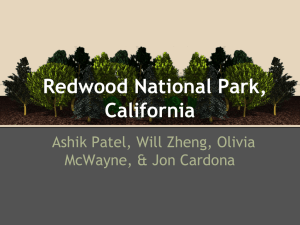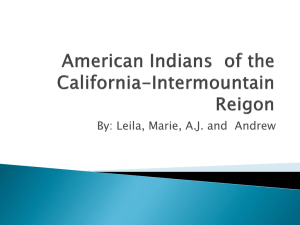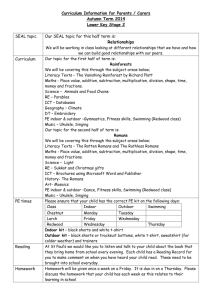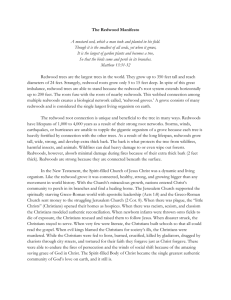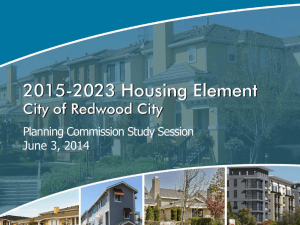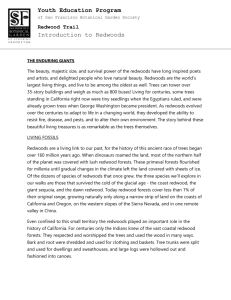2013 Proposal - California Climate Commons
advertisement
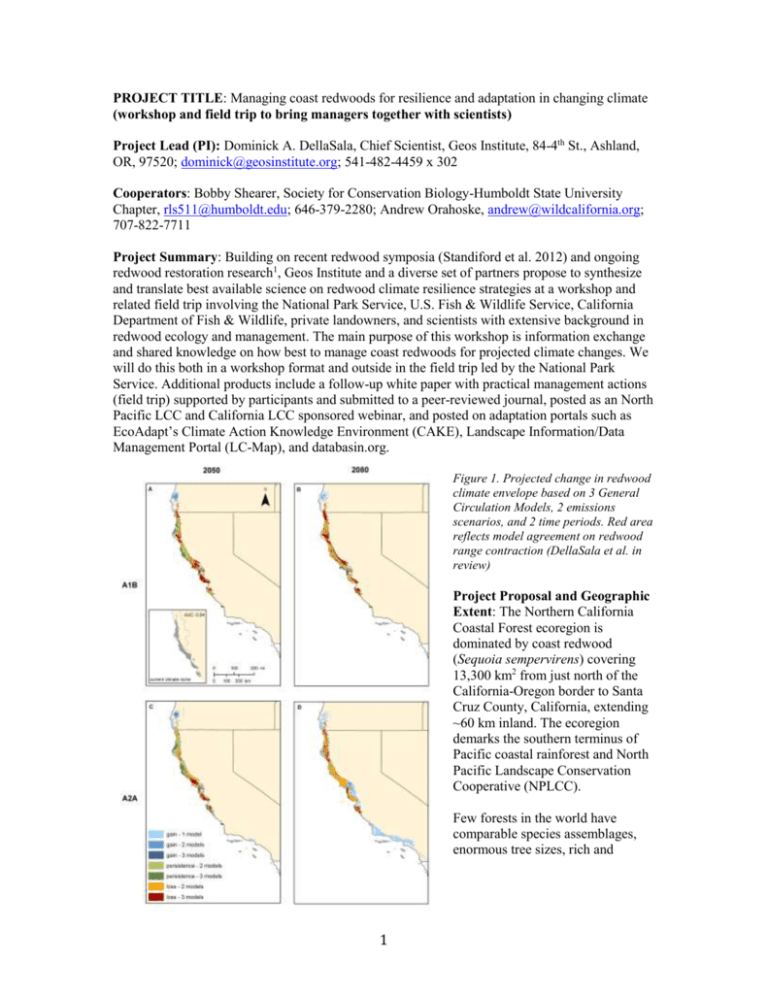
PROJECT TITLE: Managing coast redwoods for resilience and adaptation in changing climate (workshop and field trip to bring managers together with scientists) Project Lead (PI): Dominick A. DellaSala, Chief Scientist, Geos Institute, 84-4th St., Ashland, OR, 97520; dominick@geosinstitute.org; 541-482-4459 x 302 Cooperators: Bobby Shearer, Society for Conservation Biology-Humboldt State University Chapter, rls511@humboldt.edu; 646-379-2280; Andrew Orahoske, andrew@wildcalifornia.org; 707-822-7711 Project Summary: Building on recent redwood symposia (Standiford et al. 2012) and ongoing redwood restoration research1, Geos Institute and a diverse set of partners propose to synthesize and translate best available science on redwood climate resilience strategies at a workshop and related field trip involving the National Park Service, U.S. Fish & Wildlife Service, California Department of Fish & Wildlife, private landowners, and scientists with extensive background in redwood ecology and management. The main purpose of this workshop is information exchange and shared knowledge on how best to manage coast redwoods for projected climate changes. We will do this both in a workshop format and outside in the field trip led by the National Park Service. Additional products include a follow-up white paper with practical management actions (field trip) supported by participants and submitted to a peer-reviewed journal, posted as an North Pacific LCC and California LCC sponsored webinar, and posted on adaptation portals such as EcoAdapt’s Climate Action Knowledge Environment (CAKE), Landscape Information/Data Management Portal (LC-Map), and databasin.org. Figure 1. Projected change in redwood climate envelope based on 3 General Circulation Models, 2 emissions scenarios, and 2 time periods. Red area reflects model agreement on redwood range contraction (DellaSala et al. in review) Project Proposal and Geographic Extent: The Northern California Coastal Forest ecoregion is dominated by coast redwood (Sequoia sempervirens) covering 13,300 km2 from just north of the California-Oregon border to Santa Cruz County, California, extending ~60 km inland. The ecoregion demarks the southern terminus of Pacific coastal rainforest and North Pacific Landscape Conservation Cooperative (NPLCC). Few forests in the world have comparable species assemblages, enormous tree sizes, rich and 1 http://rcci.savetheredwoods.org/ 1 structurally complex canopies, productive soils, and exceptional biomass as the coast redwoods (Dunning 1998, Noss 2000, DellaSala 2011). However, <4% of the pre-settlement forest remains intact with ~ 12% protected (GAP 1 &2; Noss 2000); thus, the biodiversity of the region is considered critically endangered by the World Wildlife Fund2. Climate change is now acting in concert with land-use stressors in presenting unprecedented challenges to land managers wanting to maintain or restore a resilient redwood ecosystem3. Fog levels have declined by one-third since the early 20th century (Johnstone & Dawson 2010) and downscaled climate models project increasing temperatures and decreasing precipitation by century’s end that could dramatically reduce the climate envelope of redwood thereby greatly limiting its resilient properties (Fig. 1). Objective and Need: we propose to bring managers and practitioners together with scientists in an all day workshop and follow-up field trip led by the National Park Service on redwood science in a climate change. The workshop will provide a regional case study on preparing the southern terminus of the North Pacific LCC and serve the purpose of both the NPLCC and California LCC in strengthening partnerships between scientists and managers. For example, our project is consistent with NPLCC guiding principle – “helping managers understand the availability and effectiveness of adaptation and mitigation response actions” (Principle A) – and S-TEK Strategy Objective – “maximize the ability of partners to make informed decisions with respect to conservation and sustainable resource management or priority natural and cultural resources subject to climate change and related large-scale stressors in the NPLCC region.” Although efforts are underway to study redwood response to climate change (footnote 3), there is no comprehensive strategy currently available for helping managers prepare coast redwoods for climate change and land-use stressors despite the global significance of these forests and their vulnerability to such disturbances. In a prior workshop co-hosted by the NPLCC and National Wildlife Federation (NWF), conservation groups, agencies, and university researchers expressed interest in compiling redwood resilience strategies (NPLCC 2012). Geos Institute and partners will build on that interest by bringing together scientists and managers that are currently working on redwood restoration, conservation, and climate change to synthesize the science in a lessonslearned workshop and field trip, and to identify gaps in the regional knowledge base. The combination of a workshop and field trip will evaluate/prioritize adaptation strategies by visiting up to two demonstration sites selected from Van Eck Forest Project (Pacific Forest Trust), Arcata Community Forest (City of Arcata), or Redwood Parks (Save the Redwoods League). Our ability to engage land managers in this workshop is consistent with focus activity 4 of the NPLCC Implementation Plan, 2013-2016: incorporating existing climate information into “line management activities” as we will invite private landowners (Humboldt and Mendocino Redwood Company, Green Diamond Resources Company), state (CA Fish & Wildlife) and federal agencies (NPS, Forest Service, Fish & Wildlife Service, BLM), tribes (Yurok, Karuk, Klamath, Hoopa, Round Valley), and conservation groups (Save the Redwoods League, Pacific Forest Trust). Specifically, we will evaluate and prioritize management actions (i.e., line management activities) that best enable managers to adapt redwoods to climate change in the context of land-use stressors (especially invasives and timber management). Methods: Building on Standiford et al. (2012), we will synthesize best science coming from both climate adaptation and redwood sciences and infuse it with on-the ground knowledge that also helps to identify research gaps. We propose four steps: (1) conduct a facilitated workshop and 2 3 http://worldwildlife.org/ecoregions/na0519 http://rcci.savetheredwoods.org/ 2 field trip (National Park Service led) of redwood resilience strategies with about two dozen practitioners and scientists (see agenda) that builds on a prior workshop (Standiford et al. 2012) by adding climate change components; (2) post a draft synthesis document of redwood adaptation strategies and literature as a workshop product; (3) draft a white paper for submission to a peerreviewed journal that includes a synthesis of resilience strategies and best practices derived from the workshop and field trip (on-the-ground component); and (4) export our findings throughout the LCC network through web-based presentations and postings (e.g., CAKE, databasin, LCMap). Our workshop agenda is as follows: How To Prepare The Redwood Rainforest For Climate Change? A workshop to focus on creating resilient redwood ecosystems through best science and on-the-ground knowledge Friday, September 6 @ Humboldt State University (HSU), Arcata, CA Founders Hall, Green & Gold Room, 8:45 am- 5pm, Friday; Saturday, September 7 (field trip) Sponsored by: - Society for Conservation Biology, HSU Chapter, Arcata, CA; Environmental Protection Information Center (EPIC), Arcata, CA; Geos Institute, Ashland, OR Invitees: Save the Redwoods League, Redwood National Park, US Fish & Wildlife ServiceArcata, Yurok Tribe, Karuk Tribe, Klamath Tribe, Hoopa Tribe, Round Valley Tribe, Humboldt and Mendocino Redwood Companies, Green Diamond Resources Company, City of Arcata Community Forest, USFS Redwood Sciences Lab, California Dept. Fish & Wildlife, BLM Headwaters Reserve, HSU, U of California-Berkeley, UC Davis Cooperative Extension Workshop Topics: - How is the climate of the redwood region changing and what do managers need to do to prepare redwoods for this change? - What does a resilient redwood ecosystem look like and how can we best manage for it? - What are some of the key challenges (stressors) and opportunities for managing and conserving redwoods in a changing climate? - How can we translate the science on resilience to on-the ground implementation and how can management help inform best science (prioritized actions and best management)? - Draft document evaluating climate adaptation strategies for a resilient redwood region and management activities most likely to benefit from resilience implementation Agenda: 8:45-9:00 Introduction of workshop format (rules of engagement) and objectives 9:00-9:30 Vision for redwoods in a changing climate? (2 minute per person introductions) 9:30-10:30 Understanding climate change in the redwood region (including fire and carbon) 10:30-11:15 Understanding resilience and climate adaptation strategies (general overview) 11:15-12:15 Climate adaptation needs of focal terrestrial species 12:15:12:30 Working lunch (provided) 12:30-1:30 Invasive species and land-use stressors – understanding effective controls 1:30-2:30 Climate smart management to reduce stressors 2:30-2:45 Break (snacks and coffee) 2:45-3:45 Resilient redwoods – translating climate smart management on-the-ground 3:45-5:00 Field trip objectives and practitioner knowledge (next steps and field trip primer) Participants are encouraged to post an annotated bibliography of articles on a post-workshop discussion portal. The agenda for the field trip will include stops at up to two restoration sites selected from Redwood National Park, City of Arcata Community Forest, or Van Eck Forest 3 where discussions will be held about restoration and adaptation approaches, providing practical grounding to the science synthesis. Our proposal represents a cost-effective and rapid assessment for addressing key science and management priorities related to adaptation planning in the southern terminus of the NPLCC. The workshop is value-added in the sense that it will bring best science together for the most vulnerable portion of the NPLCC (DellaSala et al. in review, Fig. 1), spans multiple jurisdictions (state, tribal, private, and federal managers), documents lessons-learned as an important node in the NPLCC network, and given close proximity to the California LCC will provide opportunities for information exchange across neighboring LCCs. The ability to engage multiple landowners, approach to science synthesis in a pragmatic sense, workshop format, field trip, and best practices is exportable as well. Timeline of Schedule, Products, Outcomes: the main deliverable for this project is the workshop and field trip that will be completed in November 2013 in six steps: (1) send out workshop invitations and initiate follow up contacts (July); (2) assemble best science on redwood resilience and post it as a discussion portal on databasin.org or LC-Map (August-September); (3) host workshop and field trip (Sept. 6-7) at Humboldt State University; (4) draft workshop white paper by incorporating information from workshop and discussion portal (September-November); (5) finalize white paper as manuscript submission (November); and (6) submit performance report to the NPLCC regarding key findings, accomplishments, and white paper deliverable (January 2014). In addition, Geos Institute will present findings to the LCC network via a webinar (January-February 2014) and post results on databasin.org, CAKE, and LC-map for workshop participants to continue dialogue. Because we anticipate buy-in from diverse participants early on, potential outcomes include incorporation of prioritized restoration strategies that are “climate-ready” for land managers participating in the workshop. Data Sharing Disclaimer: web postings will initially include the workshop portal discussions but not the full manuscript until accepted for publication in order to allow it to go through peer review. As an interim product, we will provide the NPLCC with a report on adaptation responses to climate and land-use induced changes in support of redwood conservation. Project Team Capabilities (PIs): Dr. Dominick A. DellaSala will lead the project team. He is a recognized global authority on temperate rainforests, has published >150 technical papers on forest ecosystems, is a member of the Science & TEK subcommittee of the NPLCC, and has completed studies of climate change effects in the NPLCC. Robert Shearer is president of the HSU chapter of Society for Conservation Biology, he oversees the production of academic symposia and educational outreach events as well as the science-based investigation of ecological concerns of the redwood region. Andrew Orahoske is a biologist and environmental attorney that currently serves as Conservation Director for EPIC, engaging in forest policy matters that affect both private and public lands, including best methods for on the ground forest practices in the redwood region. The project budget includes funding for a redwood ecologist (to be determined) to help synthesize research on redwood ecology and restoration and for a separate workshop facilitator (to be determined). Dr. DellaSala will oversee the project team with assistance from Mrs. Shearer and Orahoske in outreach to participants and workshop planning. 4 Project Partners and Workshop Participants: National Park Service (Redwood Parks), California Department of Fish & Wildlife, North Pacific and California LCCs, U.S. Fish & Wildlife Service, City of Arcata, Humboldt State University, coastal tribes, private landowners, Save the Redwoods League and other conservation groups Citations DellaSala, et al. 2011. Temperate and boreal rainforests of the Pacific Coast of North America. Pp. 42-81 in D.A. DellaSala, Temperate and Boreal Rainforests of the World: Ecology and Conservation. Island Press: Washington D.C. Dunning, J. 1998. From the redwood forest. Chelsea Green Publishing Co.: Vermont. Johnstone, J. A., & T. E. Dawson. 2010. Climatic context and ecological implications of summer fog decline in the coast redwood region. Proceedings of the National Academy of Sciences of the United States of America 107:4533-4538 Noss, R.F., 2000. The redwood forest. Island Press: Washington, D.C. NPLCC. 2012. Enhancing Outreach and Facilitating Climate-Smart Implementation of Strategic Science and Traditional Ecological Knowledge Priorities in the North Pacific Landscape Conservation Cooperative, Olympia, WA. Standiford, R.B., T.J. , D.D. Piirto, and J.D. Stuart (tech eds.). 2012. Proceedings of coast redwood forests in a changing California: a symposium for scientists and managers. GTR-PWS238. 5
